Car Congestion 101
2010 May 23
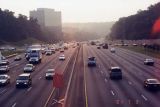 Never mind the
anti-oil, anti-global-warming, anti-fossil-fuel sentiment
that festers around the stateside intellectual
community,
the hard, cold reality is that automobile traffic on this planet
is growing fast.
Whatever you may say about any form of public transportation,
the flexibility and capability of owning an automobile is
great.
Never mind the
anti-oil, anti-global-warming, anti-fossil-fuel sentiment
that festers around the stateside intellectual
community,
the hard, cold reality is that automobile traffic on this planet
is growing fast.
Whatever you may say about any form of public transportation,
the flexibility and capability of owning an automobile is
great.
People are driving more in the industrialized west, too.
We drive more because our leisure activities involve more driving,
but we also drive more because constantly changing jobs
in a shrinking economy mean longer commutes.
Why should I spend a lot of money to live close to work
when my next job is going to be across town anyway?
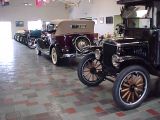 Atlanta is a mess, traffic-wise, and they're not doing much about it.
I don't think I saw timed or synchronized lights anywhere
and I don't remember gated freeway access ramps either.
India doesn't have traffic lights or STOP signs that I recall,
they control traffic access with horns and flashing headlights.
Shanghai is becoming one big traffic jam
with Beijing not too far behind.
Atlanta is a mess, traffic-wise, and they're not doing much about it.
I don't think I saw timed or synchronized lights anywhere
and I don't remember gated freeway access ramps either.
India doesn't have traffic lights or STOP signs that I recall,
they control traffic access with horns and flashing headlights.
Shanghai is becoming one big traffic jam
with Beijing not too far behind.
Choices have to be made how to control traffic.
What should we do?
I see six choices:
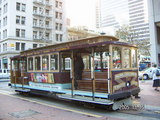 PRESSURE:
We can simply allow the traffic jams to get so terrible
that no more people want to drive.
That means everybody planning a trip
has to budget an extra half hour, maybe an hour,
because of likely delays.
Clearly this is the best deal
for automobile manufacturers and oil companies.
PRESSURE:
We can simply allow the traffic jams to get so terrible
that no more people want to drive.
That means everybody planning a trip
has to budget an extra half hour, maybe an hour,
because of likely delays.
Clearly this is the best deal
for automobile manufacturers and oil companies.
One option I don't see is getting people
voluntarily not to drive,
or not to drive at peak times on busy streets.
It's kind of like the beef boycott some years ago,
the people who sacrifice suffer
while the people who "cheat" get the goods cheaper and easier.
That's not the message to send people, is it?
PRICE:
We can make it cost more to drive,
either generally through high fuel prices (perhaps with a tax)
or specifically by location, route, or time of day.
I'm told London has a £25 charge
for driving in the center of town on weekdays.
Having tolls charged at stations means
long lines,
which defeat the purpose of price controlling traffic,
but electronic mechanisms like E-Z Pass can do the job.
We can even price lane by lane
so the cheap lane costs a penny a mile
while the "fast lane" costs a dollar.
Localized and time-of-day fuel taxes can do part of the job,
but the side effect may be to make people drive more
as they go out of their way for a cheap fill-up.
(There are ways to protect privacy
similar to no-name, cash-only cell phones
for drug dealers, pimps, and other generally
anonymous
people.)
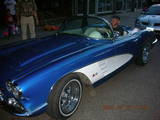 PRECEDENCE:
This is the easiest method,
only allow new registrations to replace those that expire.
You can't register another car in a big city
until another registration frees up.
It's kind of like the soaring housing prices from 1990 through 2005
kept young people from entering the real-estate market
while those of us who already owned homes could stay in them
or buy new overpriced houses
by selling our old houses at inflated prices.
If you want to reduce existing congestion,
then the new-registration rate can be set to two-thirds
or even half the cancellation rate,
every third or every other registration decrease
is not replaced.
We could have stickers for peak times on busy roads
that are similarly restricted.
PRECEDENCE:
This is the easiest method,
only allow new registrations to replace those that expire.
You can't register another car in a big city
until another registration frees up.
It's kind of like the soaring housing prices from 1990 through 2005
kept young people from entering the real-estate market
while those of us who already owned homes could stay in them
or buy new overpriced houses
by selling our old houses at inflated prices.
If you want to reduce existing congestion,
then the new-registration rate can be set to two-thirds
or even half the cancellation rate,
every third or every other registration decrease
is not replaced.
We could have stickers for peak times on busy roads
that are similarly restricted.
PRIVILEGE:
This sounds like price or precedence, but it isn't really.
We require people to apply for automobile registration,
or permission to drive at peak periods.
Maybe it could depend on having a job that required driving
or children who need to be taken someplace.
While it sounds fair,
we know how this ends up.
The people in the innermost social circles get permission
and outsiders stay out.
Once you're in, you're in and you're not going to lose it, right?
It wouldn't be useful to get permission to operate a downtown business
if you knew you weren't going to keep that permission next year.
So it becomes a situation of
"whom you know matters more than what you know,"
or what you do.
 PROFICIENCY:
This sounds a bit fairer,
let people drive who know how.
Set some standard of driving capability and performance
and hold people to it.
Initially, this would be great!
Imagine that every driver at rush hour has passed a rigorous test
and that anybody who gets caught on video
not signaling for a turn
or weaving out of lane
or running a red light
or turning wide into a wrong lane
doesn't get to drive to work anymore.
Wouldn't that be nice?
PROFICIENCY:
This sounds a bit fairer,
let people drive who know how.
Set some standard of driving capability and performance
and hold people to it.
Initially, this would be great!
Imagine that every driver at rush hour has passed a rigorous test
and that anybody who gets caught on video
not signaling for a turn
or weaving out of lane
or running a red light
or turning wide into a wrong lane
doesn't get to drive to work anymore.
Wouldn't that be nice?
Alas,
the people who determine proficiency
many not, themselves, be proficient.
We know that traffic tickets and driving tests today
ensure neither safety nor proficiency.
Even though 90% of all drivers are in the top 10% of the population
(just ask them!),
the results on American roads aren't something I'm proud of.
Besides, if there is some proficiency standard for driving
in the busy zone,
people will drive up to that standard and the roads will
again be busy,
perhaps with better drivers,
but still busy.
Proficiency solves the performance problem,
but not the congestion problem,
unless you set the standard very high.
Germany seems to have done this to some extent.
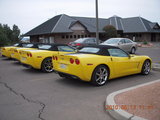 PRIVATE ENTERPRISE:
My choice would be to make as much of the traffic network
a private system with public access,
much as restaurants are today.
They're privately owned and set their own prices and conditions
but they have
access
responsibility to the public.
The agencies that own the roads can decide the tradeoffs
between congestion and permission.
I would hope they would choose time-of-day pricing,
perhaps with fast lanes and slow lanes differentiated by price
and traffic-law enforcement more consistent with safety
than the current revenue-collection attitude
we see on public highways.
PRIVATE ENTERPRISE:
My choice would be to make as much of the traffic network
a private system with public access,
much as restaurants are today.
They're privately owned and set their own prices and conditions
but they have
access
responsibility to the public.
The agencies that own the roads can decide the tradeoffs
between congestion and permission.
I would hope they would choose time-of-day pricing,
perhaps with fast lanes and slow lanes differentiated by price
and traffic-law enforcement more consistent with safety
than the current revenue-collection attitude
we see on public highways.
Ultimately,
if we're going to put more people to work
and we don't want more people on the roads,
then we're going to have to live closer to work.
Remember the movie "Brainstorm" where they lived
in company-campus apartments?
Getting to living-near-work stability
means getting to work stability,
another social problem in these post-modern times.
Reducing traffic congestion makes the air cleaner, too.
In any case,
we're going to choose one of these,
or maybe something I haven't thought of.
There isn't any NO-CHOICE option.
The indecision to act is the decision to act,
to choose the PRESSURE option
of increasingly-horrible traffic congestion
we're seeing most places.
It's going to get a lot worse.
THE ADAM HOME PAGE
adam@the-adam.com
 Never mind the
anti-oil, anti-global-warming, anti-fossil-fuel sentiment
that festers around the stateside intellectual
community,
the hard, cold reality is that automobile traffic on this planet
is growing fast.
Whatever you may say about any form of public transportation,
the flexibility and capability of owning an automobile is
great.
Never mind the
anti-oil, anti-global-warming, anti-fossil-fuel sentiment
that festers around the stateside intellectual
community,
the hard, cold reality is that automobile traffic on this planet
is growing fast.
Whatever you may say about any form of public transportation,
the flexibility and capability of owning an automobile is
great.




